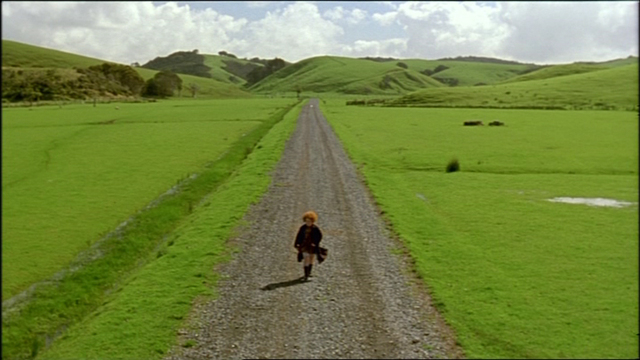With her 1990 film An Angel at my Table, Jane Campion solidified a pattern for herself. Her films would be about extraordinary women in stifling circumstances. Whether it is mental institutions, marital institutions, family, or society, Campion’s heroines have to overcome great difficulties in order to live truly as themselves. An Angel at my Table, based on the autobiographies of New Zealand author Janet Frame, stands out as the only film of Campion’s early body of work that could be comfortably called a biopic. But to dismiss An Angel at my Table as just another biopic would be to ignore the unusual film Campion has made about an unusual woman.
Janet Frame’s life was as strange as any of the twenty works she wrote. She spent her childhood poor but happy in rural New Zealand, grew into an awkward woman whose anxiety was mistaken for mental illness, spent eight years in a mental institution, was freed when her writing was published, and went on to become a New Zealand icon. Campion cast three actresses to play Frame as she matured: Karen Fergusson, Alexia Keogh, and finally the incredible Kerry Fox. The three actresses are unified by a shock of red, unruly hair, and an awkward physicality that show someone more comfortable in her imagination than in the world.
An Angel at my Table is shot in a straightforward style far removed from the canted camera angles and wide angle lenses of Sweetie. The practical reason for this was the film's humble beginnings as a TV miniseries. However, beyond practicality, this less showy camera blocking lends itself to grounding Janet Frame’s story in reality. Frame’s impoverished but happy upbringing, her nightmarish eight year detention in a mental institution, and her subsequent successful writing career are shown in mostly medium or long shots, with Janet at the visually at the center. Typically subjects are set off-center in a shot, because symmetrical framing looks odd to the audience’s eye. Placing Janet at the center of the frame visually sets Janet apart - reacting to, but separate from, the world around her.
Janet Frame's colorful inner life after the jump.

Campion augments Janet’s oddness through hints in production design and color. For the most part, the world around Janet is a dull place of neutrals, blacks, and dirty browns. When she gets to the insane asylum, things take a sick, blue-ish hue. There are three exceptions: the brilliant green of the New Zealand forests where Janet grows up, the happy warm tones of Spain where Janet falls in love, and Janet herself, a tangle of red hair and colorful, ill-fitting clothes. It’s through this carefully crafted design that Campion can insert her brand of whimsy, illuminating Janet’s colorful inner life through the bits of color she (and the audience) finds around her. Campion chooses color and production design, rather than overuse of voice over, to show what inspires Janet to write.
The result of Campion’s indulgent but nonfrivolous film was more recognition, both at home and abroad, for subject and director. Not all of it was good - Janet Frame at one point complained that she’d gone from being “the mad writer” to “the mad fat writer” thanks to the film. However, as An Angel at my Table won awards from the Venice Film Festival, the Independent Spirit Awards, and the New Zealand Film and TV Awards, it proved that its director was two things: a proud Kiwi, and a disciplined director. Sweetie was a flashy introduction, but An Angel at my Table proved that Campion had the focus to tell a full, sweeping story over the course of a few hours. (It’s over 2 ½ hours long, just a warning.) Campion’s next film would show the full maturation of her skill, and win the director her highest accolades yet.


This month on Women's Pictures:

4/16 - The Piano (1993) - Jane Campion became the second woman in history to win an Academy Award nomination for this multi-Oscar winning drama about a mute woman in nineteenth century New Zealand. (Amazon Instant Video)
4/23 *NEW FILM* - In The Cut (2004) - This film has been requested on all forms of social media AND in the comments section! It was described alternately as Jane Campion's Best and Jane Campion's Worst. We're not ones to turn away from a controversial film. Especially not one starring Meg Ryan and Mark Ruffalo. (Amazon Instant Video)
4/30 - Bright Star (2009) - Join us for the Hit Me With Your Best Shot crossover with Campion's latest feature about poet John Keates. This is going to be a tough one to choose just one shot for. (Amazon Instant Video)